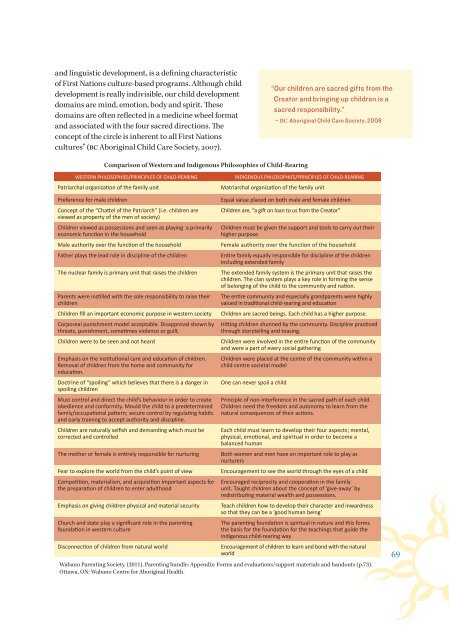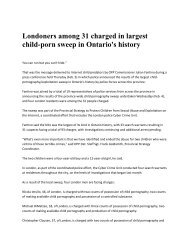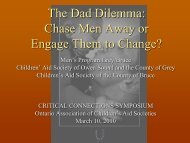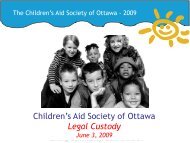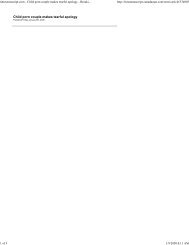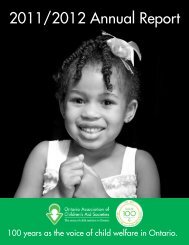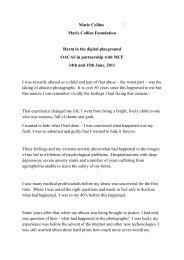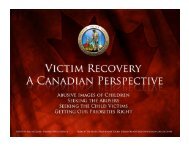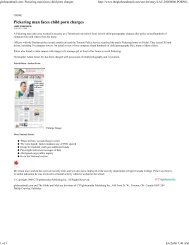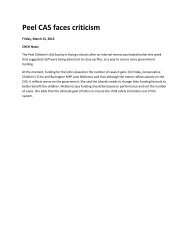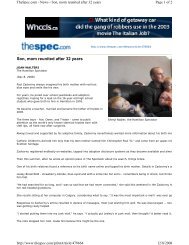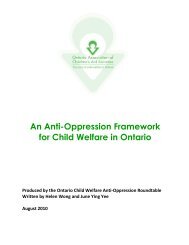English - Ontario Association of Children's Aid Societies
English - Ontario Association of Children's Aid Societies
English - Ontario Association of Children's Aid Societies
You also want an ePaper? Increase the reach of your titles
YUMPU automatically turns print PDFs into web optimized ePapers that Google loves.
and linguistic development, is a defining characteristic<br />
<strong>of</strong> First Nations culture-based programs. Although child<br />
development is really indivisible, our child development<br />
domains are mind, emotion, body and spirit. These<br />
domains are <strong>of</strong>ten reflected in a medicine wheel format<br />
and associated with the four sacred directions. The<br />
concept <strong>of</strong> the circle is inherent to all First Nations<br />
cultures” (BC Aboriginal Child Care Society, 2007).<br />
“Our children are sacred gifts from the<br />
Creator and bringing up children is a<br />
sacred responsibility.”<br />
- BC Aboriginal Child Care Society, 2008<br />
Comparison <strong>of</strong> Western and Indigenous Philosophies <strong>of</strong> Child-Rearing<br />
WESTERN PHILOSOPHIES/PRINCIPLES OF CHILD-REARING<br />
Patriarchal organization <strong>of</strong> the family unit<br />
INDIGENOUS PHILOSOPHIES/PRINCIPLES OF CHILD-REARING<br />
Matriarchal organization <strong>of</strong> the family unit<br />
Preference for male children<br />
Concept <strong>of</strong> the “Chattel <strong>of</strong> the Patriarch” (i.e. children are<br />
viewed as property <strong>of</strong> the men <strong>of</strong> society)<br />
Children viewed as possessions and seen as playing a primarily<br />
economic function in the household<br />
Male authority over the function <strong>of</strong> the household<br />
Father plays the lead role in discipline <strong>of</strong> the children<br />
The nuclear family is primary unit that raises the children<br />
Parents were instilled with the sole responsibility to raise their<br />
children<br />
Children fill an important economic purpose in western society<br />
Corporeal punishment model acceptable. Disapproval shown by<br />
threats, punishment, sometimes violence or guilt.<br />
Children were to be seen and not heard<br />
Emphasis on the institutional care and education <strong>of</strong> children.<br />
Removal <strong>of</strong> children from the home and community for<br />
education.<br />
Doctrine <strong>of</strong> “spoiling” which believes that there is a danger in<br />
spoiling children<br />
Must control and direct the child’s behaviour in order to create<br />
obedience and conformity. Mould the child to a predetermined<br />
family/occupational pattern; secure control by regulating habits<br />
and early training to accept authority and discipline.<br />
Children are naturally selfish and demanding which must be<br />
corrected and controlled<br />
The mother or female is entirely responsible for nurturing<br />
Fear to explore the world from the child’s point <strong>of</strong> view<br />
Competition, materialism, and acquisition important aspects for<br />
the preparation <strong>of</strong> children to enter adulthood<br />
Emphasis on giving children physical and material security<br />
Church and state play a significant role in the parenting<br />
foundation in western culture<br />
Disconnection <strong>of</strong> children from natural world<br />
Equal value placed on both male and female children<br />
Children are, “a gift on loan to us from the Creator”<br />
Children must be given the support and tools to carry out their<br />
higher purpose<br />
Female authority over the function <strong>of</strong> the household<br />
Entire family equally responsible for discipline <strong>of</strong> the children<br />
including extended family<br />
The extended family system is the primary unit that raises the<br />
children. The clan system plays a key role in forming the sense<br />
<strong>of</strong> belonging <strong>of</strong> the child to the community and nation.<br />
The entire community and especially grandparents were highly<br />
valued in traditional child-rearing and education<br />
Children are sacred beings. Each child has a higher purpose.<br />
Hitting children shunned by the community. Discipline practiced<br />
through storytelling and teasing.<br />
Children were involved in the entire function <strong>of</strong> the community<br />
and were a part <strong>of</strong> every social gathering<br />
Children were placed at the centre <strong>of</strong> the community within a<br />
child centre societal model<br />
One can never spoil a child<br />
Principle <strong>of</strong> non-interference in the sacred path <strong>of</strong> each child.<br />
Children need the freedom and autonomy to learn from the<br />
natural consequences <strong>of</strong> their actions.<br />
Each child must learn to develop their four aspects; mental,<br />
physical, emotional, and spiritual in order to become a<br />
balanced human<br />
Both women and men have an important role to play as<br />
nurturers<br />
Encouragement to see the world through the eyes <strong>of</strong> a child<br />
Encouraged reciprocity and cooperation in the family<br />
unit. Taught children about the concept <strong>of</strong> ‘give-away’ by<br />
redistributing material wealth and possessions.<br />
Teach children how to develop their character and inwardness<br />
so that they can be a ‘good human being’<br />
The parenting foundation is spiritual in nature and this forms<br />
the basis for the foundation for the teachings that guide the<br />
indigenous child-rearing way<br />
Encouragement <strong>of</strong> children to learn and bond with the natural<br />
world<br />
Wabano Parenting Society. (2011). Parenting bundle: Appendix: Forms and evaluations/support materials and handouts (p.73).<br />
Ottawa, ON: Wabano Centre for Aboriginal Health.<br />
69


